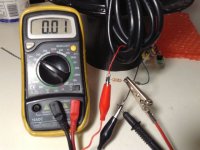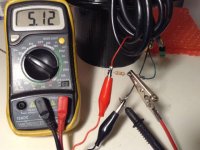Synon
10 W
So I received a 1kw 48v kit (I believe it's of the yescom variety) from my favorite cousin the other day. He mentioned it needed some work and I see why, the wiring that enters the hub motor was chewed up but fixable, everything was exposed. I pulled the cover off and pulled some clean wire down into the motor and re-soldered everything back together.
Long story short, I hooked up the controller, throttle, and 52v worth of SLA's to test this puppy out and I get no movement. The battery indicator on the thumb throttle lights up with a full battery light, the red button is out so the controller should be on, the wheel spins by hand with minimal effort and is not binding on anything. I took some voltages from the controller/throttle connections and red/black gives me .48v and green/black 0v. Am I correct in thinking my problem is the controller? Is there anything else I can test and are these controllers "fixable" or is it not worth the effort? Or could it possibly be the throttle? I'm trying to find out if there was some shorting when those wires got exposed, I'd guess yes. Would that affect the hub motor at all or just the controller?
This is my first ebike build so I'm definitely needing some help from here, what do you all think?
Long story short, I hooked up the controller, throttle, and 52v worth of SLA's to test this puppy out and I get no movement. The battery indicator on the thumb throttle lights up with a full battery light, the red button is out so the controller should be on, the wheel spins by hand with minimal effort and is not binding on anything. I took some voltages from the controller/throttle connections and red/black gives me .48v and green/black 0v. Am I correct in thinking my problem is the controller? Is there anything else I can test and are these controllers "fixable" or is it not worth the effort? Or could it possibly be the throttle? I'm trying to find out if there was some shorting when those wires got exposed, I'd guess yes. Would that affect the hub motor at all or just the controller?
This is my first ebike build so I'm definitely needing some help from here, what do you all think?



